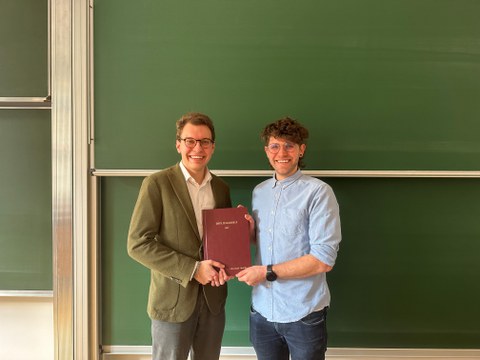Feb 15, 2024
Congratulations to Christoph Mettke on his diploma thesis

Christoph Mettke (left) after the successful defence of his thesis with supervisor Thaddäus Weniger (M. Sc.)
On 12 February 2024, Mr Christoph Mettke successfully defended his thesis on "Balancing and modelling of power-to-fuel processes". The reviewers were impressed and awarded the thesis, supervised by Thaddäus Weniger (M.Sc.), a grade of 1,0.
The task was to present and compare various power-to-fuel (PtF) technologies and select a suitable process for installation, for example at a waste-to-energy plant site. Waste-to-energy plants offer the advantage that they already have an established infrastructure and a steady flow of partially biogenic materials, making them particularly interesting as a carbon source for the production of synthetic fuels. The energy and material balancing of the processes as well as their modelling and the consideration of different operating concepts were to be taken into account.
The aim of the paper was to find out which PtF processes are well suited to implementing the production of sustainable basic chemicals or fuels and thus contributing to the defossilisation of the industrial and transport sectors.
Mr Mettke came to the following conclusion:
"In a future energy system that is based almost entirely on renewable energies, there will still be CO2 emitters in the medium term whose emissions should be reduced as much as possible. This can be achieved, for example, in waste-to-energy plants by capturing and utilising the CO2. It is also interesting for the operators of these power plants to have options other than selling electricity, especially in times of low electricity prices.
For these reasons, various flexibilisation options were investigated for a waste-to-energy plant that offer solutions to both challenges.The focus was on Fischer-Tropsch synthesis and methanol synthesis. Both require CO2 and hydrogen as input materials in order to produce fuels and chemicals that will still be needed in the medium term. In the process investigated here, the CO2 is to be separated from the flue gases of the power plant and hydrogen is to be produced with the help of an electrolyser.
After analysing both synthesis processes, methanol synthesis proved to be more advantageous in terms of energy and materials. For this, two operating strategies in combination with a waste-to-energy plant were to be compared. To simulate these operating strategies, models for the relevant plants were created in the programming language Modelica with some additional libraries.
In the evaluation of the simulation results, electricity price-orientated operation proved to be more economically viable than continuous operation of the plants in 2019. However, it was also found that without carbon pricing of the waste-to-energy plants, electricity sales in 2019 generated the highest profits."
Further development of the existing models into a more detailed techno-economic analysis is planned in subsequent student projects.
